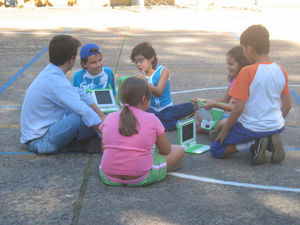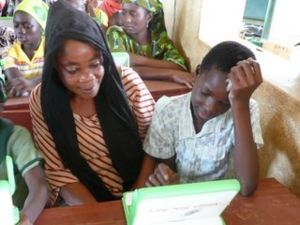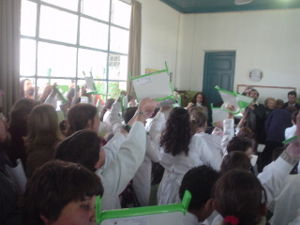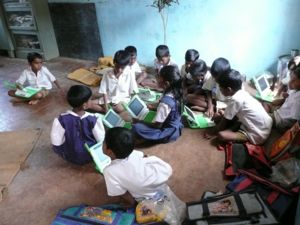Educators
Welcome
One Laptop per Child is an education project, not a laptop project. Our goal is to provide children with access to libraries of knowledge, ideas, experiments, and art — to provide a window into the world, with examples and references on which to build.
This page is for educators interested in contributing to these libraries of knowledge, and teachers using XOs in their classrooms. If you are a teacher using XOs in your classroom, you may want to look at the Education Portal or to explore the page for XO Teachers.
Trial schools
| Porto Alegre OLPC Brazil |
Galadima OLPC Nigeria |
Ban Samkha OLPC Thailand |
|---|---|---|
File:Hiking02.jpg Ban Samkha is a rural village in northern Thailand | ||
| Cardal OLPC Uruguay |
Arahuay OLPC Peru |
Khairat school OLPC India |
"Pupils go even beyond what I can teach in the class. It's a very interesting thing to use. I personally have a better idea about teaching... We discovered that giving them time to discover something and to do it in their own way, they feel more happy and they are so excited in using it that, 'Yes, I discovered it! Yes, I can get it!! Yes, I can do this on my own!!!' Teaching is getting more interesting and less stressful." — Mr. O., Galadima School, Abuja, Nigeria
Schools who want to work with XOs in the classroom (and don't yet have any) should go to Interested schools.
Vision
The XO laptop will bring a world of new ideas, images, and materials to children around the world. It will also provide students and teachers with new ways to collaborate, create, and transform works over time. Our belief in collaboration as a fundamental part of learning underscores our commitment to editable document formats, revision tracking, and careful attribution of authors and sources.
All of our projects are collaborative, and this wiki is where each of our projects takes shape. If you take a look around, you'll find projects in all stages of completion-- from rough outlines and meeting notes to detailed workplans and polished documents. Feel free to contribute your ideas and expertise to any project that interests you. We're counting on you to make OLPC a success.
To learn more about our model for content creation, our network of curators, and our plan for school servers that will host (and share) each school's digital library, visit the Content page. Otherwise, keep reading to find out how you can join in.
Join In
What to do first?
- Read about the OLPC Learning Vision to learn more about why we think children in developing countries need laptops and what we think laptops will enable them to do.
- Visit the OLPC Education Portal to learn about various activities, projects, and educational organizations that are involved with the project.
- Familiarize yourself with our ideas about content and collaboration, and the various Creative Commons licenses. As a rule, we want educational materials produced for and connected with OLPC to be free and open source.
And then what?
Play, learn, explore, exchange-- you can do anything you want! Here are some ideas to help you get started.
Join the community
- Visit our Contributors program page.
- Create an account on the OLPCWiki!
- Visit our sister organization, Sugar Labs and join their wiki.
- Add yourself, or your organization, to the educator Roll Call page.
- Add an educator user box to your user page, which will add you to Category:Educators.
- Create an educational organization page for your organization, group, or school.
- Find a project that excites you.
Contribute content
- Read about the content repository that will reside on the school servers.
- Add to the list of ideas for content that should be included in the repository.
- Contribute your content directly to OLPC by following these instructions.
Create activities
- Read the educational activity guidelines to learn about the features of the XO that pertain directly to educators.
- Explore our repository of activity outlines and lesson plans.
- Contribute to our collection of story-based learning activities.
- Create a new activity, either based on one of our sample learning activities or entirely from scratch.




